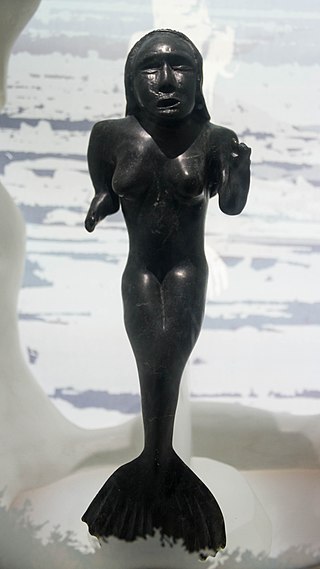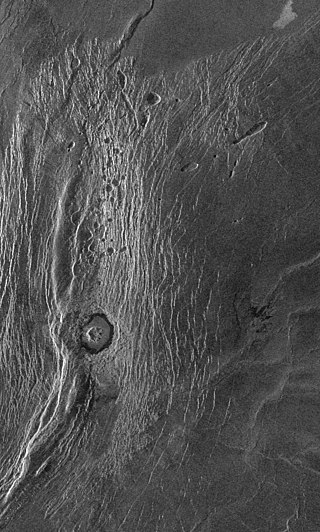This article relies largely or entirely on a single source .(March 2018) |
The topic of this article may not meet Wikipedia's general notability guideline .(March 2018) |
In Inuit mythology, Akna ("mother") is a goddess of fertility and childbirth. [1]
This article relies largely or entirely on a single source .(March 2018) |
The topic of this article may not meet Wikipedia's general notability guideline .(March 2018) |
In Inuit mythology, Akna ("mother") is a goddess of fertility and childbirth. [1]

This is a demography of the population of Greenland including population density, ethnicity, economic status, religious affiliations and other aspects of the population.

Inuit religion is the shared spiritual beliefs and practices of the Inuit, an indigenous people from Alaska, northern Canada, parts of Siberia and Greenland. Their religion shares many similarities with some Alaska Native religions. Traditional Inuit religious practices include animism and shamanism, in which spiritual healers mediate with spirits. Today many Inuit follow Christianity, but traditional Inuit spirituality continues as part of a living, oral tradition and part of contemporary Inuit society. Inuit who balance indigenous and Christian theology practice religious syncretism.

Sedna is the goddess of the sea and marine animals in Inuit mythology, also known as the Mother of the Sea or Mistress of the Sea. The story of Sedna, which is a creation myth, describes how she came to rule over Adlivun, the Inuit underworld.
In Inuit mythology, Arnakuagsak was an Inuit goddess, one of the primary deities of the religion, who was responsible for ensuring the hunters were able to catch enough food and that the people remained healthy and strong. She was worshipped primarily in Greenland, but was essentially equivalent to the Canadian Sedna or Arnapkapfaaluk and the Alaskan Nerrivik.
In Inuit mythology, Nujalik is the goddess of hunting on land.
In Inuit mythology, Tootega is a wisened old goddess, who lives in a stone hut and has the ability to walk on water.
In Inuit religion, Pukkeenegak is a goddess of children, pregnancy, childbirth and the making of clothes. Considered a benevolent goddess, Pukkeenegak is responsible for childbirth and providing food and clothing materials to Inuit women. She is usually depicted with a tattooed face, wearing tall boots.
In Inuit religion, Pinga is a goddess of the hunt and medicine. She is heavily associated with the sky.
In Inuit religion, Silap Inua or Sila is similar to mana or ether, the primary component of everything that exists; it is also the breath of life and the method of locomotion for any movement or change. Silla was believed to control everything that goes on in one's life.
In Inuit mythology, Akycha is a solar goddess worshipped in Alaska.
Anguta is the father of the sea goddess Sedna in the Inuit religion.

Ishtar Terra is the second largest of the three continental terrae regions on the planet Venus, the others being Aphrodite Terra and Lada Terra.
Arnapkapfaaluk was the sea goddess of the Inuit of Canada's Coronation Gulf area. Although occupying the equivalent position to Sedna within Inuit religion, in that she had control of the animals of the seas, she was noticeably different as can be seen by the English translation of her name.
Ataksak is a goddess in Inuit mythology. She is the ruler of the sky, and represents the light in the world that brings joy and happiness to the people.

Akna Montes are a mountain range on Venus centered at 68.9°N, 318.2°E and stretching 830 km long.
Akna may refer to:

AKNA is a protein that in humans is encoded by the AKNA gene. The protein is an AT-hook transcription factor which contains an AT-hook binding motif. The protein is expressed as different isoforms. AKNA is known to upregulate expression of the receptor CD40 and its ligand CD40L/CD154.

Quviasukvik, is the first day of the year according to the Inuit. The festival of the New Year is celebrated by the Inuit, Yupik, Aleut, Chukchi, NunatuKavut and the Iñupiat. The feast originally derives from traditional Inuit religion but in modern times, it has Christian influences.